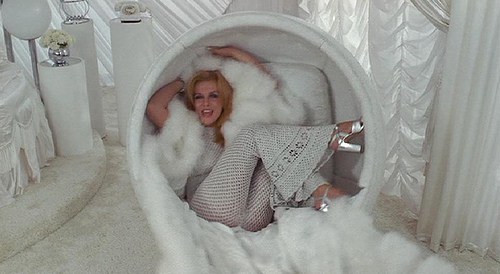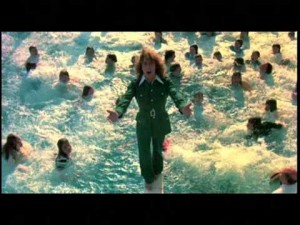From Monthly Film Bulletin, April 1975 (Vol. 42, No. 495). — J.R.
Tommy
Great Britain, 1975 Director: Ken Russell
Cert-AA. dist-Hemdale. p.c—The Robert Stigwood Organisation.
exec. p-Beryl Vertue, Christopher Stamp. /;Robert Stigwood, Ken
Russefl. assoc. p-Harcy Benn. p. manager-John Comfort. asst. d-
Jonathan Benson. sc-Ken Russell. Based on the rock opera by Pete
Townshend and the Who. addit. Material–John Entwistle, Keith Moon.
ph–Dick Bush, Ronnie Taylor. In colour. sp. ph. effects–Robin Lehman.
ed—Stuart Baird. a.d–John Clark. set dec–Paul Dufficey, Ian Whittaker.
sp. Effects–Effects Associates, Nobby Clarke,_Carygra Effects. m/songs–
“Captain Walker Didn’t Come Home”. “It’s a Bov !” “’51 is Going to be a
a Good Year”, “What About the Boy ?”, “See Me, Feel Me”, “The
Amazing Journey”, “Christmas”, “The Acid Queen”, “Do You Think
It’s All Right?”, “Cousin Kevin”, “Fiddle About”, “Sparks”, “Pinball
Wizard”, ‘Today It Rained Champagne” ,”‘There’s a_Doctor” , “Go to the
Mirror”, “Tommy Can You Hear Me !’” “Smash the Mirror”, “I’m Free”,
“Miracle Cure”, “Sensation”, “Sally Simpson”, “Welcome”, “Deceived”,
“Tommy’s Holiday Camp”, “We’re Not Gonna Take It”, “Listening to
You” by Pete Townshend and The Who [Roger Daltrey,John Entwistle,
Keith Moon, “Eyesight to the Blind” by Sonny Boy Williamson. m.d–
Pete Townshend. musicians-Elton John, Eric Clapton, Keith Moon,
John Entwistle, Ronnie Wood, Kenny Jones, Nicky Hopkins, Chris
Stainton , Fuzzy Samuels, Caleb Quayle, Mick Ralphs, GRaham Deakin,
Phil Chen, Alan Ross, Richard Bailey, Dave Clinton, Tony_Newman,
Mike Kelly, Dee Murray, Nigel Ollson, Ray Cooper, Davey_Johnstone,
Geoff Daley, Bob Efford, Ronnie Ross, Howie Casey. vocal chorus–Liza
Strike, Simon Townshend, Mylon Le Fevre, Billy Nicholls, Jeff Roden,
Margo Newmano Gillian Mclntosh, Vicki Brown, Kit Trevor, Helen
Shappell, Paul Gurvitz, Alison Dowling. Music synthesizer programming
by–Pete Townshend. theatre organ played, by–Gerald Shaw. arranged
by–Martyn Ford. cost–Shirley Russell. choreo–Gillian Gregory.
make-up–George Blackler, Peter Robb-King. sd. rec–Ian Bruce.
sd. re-rec-Bill Rowe. Quintophonic Sound developed by–John Mosley.
l.p–Ann-Margret (Nora Walker), Oliver Reed (Frank Hobbs), Roger
Daltrey (Tommy), Elton John (Pinball Wizard), Eric Clap!on_ (Preacher)-,
Keith Moon (Uncle Ernie), Jack Nicholson (Doctor), Robert Powell
(Group Captain Walker), Paul Nicholas (Cousin. Kev!n), Tina Turner
(Acid Queen), Barry Winch (Young Tommy),_Victoria Russell (Sally
Simpson), Ben Aris (Reverend Simpson), Mary Holland (Mrs. Simpson),
Jennifer Baker (lst Nurse), Susan Baker (2nd Nurse), Juliet King and
Gillian King (Handmaidens to Acid Queen), Imogen Claire (Nurse), John
Entwistle and Pete Townshend (Themselves), Arthur Brown (Priest),
Gary Rich (Rock Musician), Dick Allan (President of Black Angels),
Eddie Stacey (Bovver Boy). 9,755 ft. 108 mins.
England, World War II. After a brief idyllic marriage to Nora,
Group Captain Walker, an R.A.F. bomber pilot, is shot down over
enemy lines, and a few months later Nora gives birth to a son,
Tommy. During a visit to Bernie’s Holiday Camp, she meets and
weds one of the employees, Frank Dobbs, and the three go to live in
her house. One night, Walker unexpectedly appears, finding Frank
and Nora in bed together, and is killed by Frank; Tommy, witnessing
the murder in a mirror, becomes incurably deaf, dumb and blind. The
1970s: Tommy is taken to a faith healer who has no success, then to
the Acid Queen, who injects him with drugs; the latter experience
permits him to see only a red image of himself in a mirror. Left with
his sadistic cousin Kevin who brutally tortures him, he is subsequently
able to see a yellow image in a mirror beside the red one; after
being sexually abused by his Uncle Ernie, he can also see a
blue image. His red, yellow and blue image leaves the mirror and
goes to an automobile junkyard; Tommy follows, comes upon a
pinball machine, and plays it so well that he immediately becomes a
celebrity, and beats the former World Champion in a tournament.
After a specialist fails to cure him and Nora has a nervous break-
down, she pushes him through a mirror and he promptly regains
all his senses. Declaring himself a new Messiah, he becomes an
evangelist with ‘Holiday Camps” in every major world capital,
offering tinted glasses, corks, earplugs and pinball machines to the
converts while Frank collects the profits. But the followers rebel,
destroying the central holiday camp and killing Frank and Nora.
Alone and free, Tommy climbs a mountain to worship at the feet of
his own image.
Like every other recent Ken Russell film, Tommy is decidedly a
mixed bag of effects; but for once, the unevenness of the mixture
seems evenly matched by the strengths and limitations of the original
material. After all his dogged attempts both to inflate and undermine
the romanticism in such diverse sources as Lawrence, Tchaikovsky,
The Boy Friend and Gaudier-Brzeska, evidently seeking to resolve
the contradictions of his approach in a kind of pure theatricality,
Russell finds in Pete Townshend’s celebrated ‘rock opera’ just the
right amount of imaginative possibility, open-ended pretension and
musical energy to make this adaptation neither a betrayal nor an
improvement but a true meeting of equivalent sensibilities. This is
not to suggest that he hasn’t taken certain liberties with the material:
the alternating use of separate choruses from “Tommy’s Holiday
Camp” and “We’re Not Gonna Take It” on the original album, for
instance, is replaced here by one song in toto followed by the other
— permitting both a gain in narrative continuity and a loss in moral
ambivalence (and, incidentally, still eliding any indication of why
Tommy’s followers decide to revolt) — while the concluding sequence
clearly offers only one of many possible readings of “Listening to
You”, fusing the stylistic narcissism of both The Who and Russell
into a summary statement acknowledging self-worship as the overriding
preoccupation that they share, with a comparable preference for flash
over depth and a hankering after profundity informing both sides of the
collaboration. For the most part, however, Russell’s illustration of
the lyrics is strictly literal — e.g., Sally Simpson actually does marry a
a rock musician from California — which places a considerable amount
of the creative burden on Townshend’s shoulders. (In the monaural
version under review, the lyrics of on-screen actors occasionally
register with a disembodied effect, but this actually helps to
highlight the parallel contributions of director and music). Among
the less successful aspects of this joint effort are the first twenty
minutes or so, which resemble a run-on TV commercial; the Las
Vegas inflections of Ann-Margret — rather at odds with the ethnic
tenor of the music, and not made any more palatable by her
strenuous efforts to ‘act’ the lines; and the unproductive ugliness
of the set in Eric Clapton’s faith-healing headquarters, riddled with an
assortment of unconvincing Marilyn Monroe icons. The best parts
generally feature the best songs : Tina Turner’s ‘”Acid Queen” sequence
is a mini-masterpiece of visual inventiveness and dramatic cohesion,
helped in no small measure by Turner’s extraordinary showmanship,
while the plastic conceits accompanying “Pinball Wizard”– from
Elton John’s outrageous outfit to the actual flipper machines, both
seen against a teeming mob of spectators — are lively and inspired. If
Russell’s imagination generally seems to operate more on-literary
than musical terms, and invariably within short units comprising the
length of the tunes rather than over lengthier structures — making for
a certain choppiness in continuity, and an acute absence of overall
dynamics (with every sequence characteristically pitched at a hit-or-
miss fortissimo) — it should be noted that even at its most lacklustre
and tasteless junctures, Tommy is never boring, and always full of
energy; and given the very loose narrative framework and imprecise
plot that Russell has to work with, this is no small achievement.
JONATHAN ROSENBAUM




